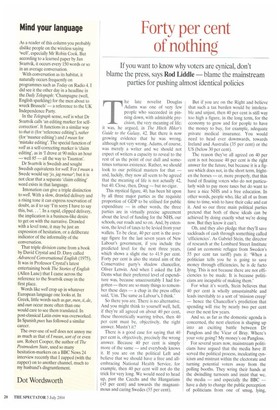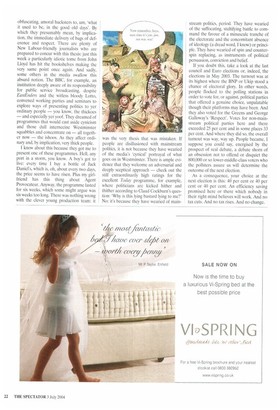Forty per cent of nothing
If you want to know why voters are cynical, don't blame the press, says Rod Liddle — blame the mainstream parties for pushing almost identical policies
The late novelist Douglas Adams was one of very few people who succeeded in pinning down, with admirable precision, the very meaning of life: it was, he argued, in The Hitch Hiker's Guide to the Galaxy, 42. But there is now growing evidence that he was wrong, although not very wrong. Adams, of course, was merely a writer and we should not expect of writers a capacity to reveal to the rest of us the point of our dull and sometimes tortuous existence. Rather, we should look to our political masters for that — and, luckily, they now all seem to be agreed that the meaning of life is not actually 42, but 40. Close, then, Doug — but no cigar.
This mystical figure, 40, has been hit upon by all three major parties as the requisite proportion of GDP to be utilised for public expenditure — in other words, the three parties are in virtually precise agreement about the level of funding for the NHS, our schools, our roads and so on. And, by extension, the level of taxes to be levied from your wallets. To be clear, 40 per cent is the average figure for the last seven years of New Labour's government, if you include the predicted level for the next three years, which shows a slight rise to 41.9 per cent. Forty per cent is also the stated aim of the Conservative party's shadow chancellor, Oliver Letwin. And when I asked the Lib Dems what their preferred level of expenditure was, because unaccountably I had forgotten — there are so many things to remember these days — a chap in the press office said, 'Urn. The same as Labour's, I think.'
So there you are. There is no alternative. And you might think to yourself well, hell, if they're all agreed on about 40 per cent, these theoretically warring tribes, then 40 per cent must be, objectively, the right answer. Mustn't it?
There is a good case for saying that 40 per cent is, objectively, precisely the wrong answer. Because 40 per cent is simply more of the same — and everybody knows it. If you are on the political Left and believe that we should have a free and allembracing National Health Service, for example, then 40 per cent will not do the trick for very long. We would need to head up, past the Czechs and the Hungarians (45 per cent) and towards the magnanimous and caring Swedes (55 per cent). But if you are on the Right and believe that such a tax burden would be intolerable and unjust, then 40 per cent is still way too high a figure, in the long term, for the economy to grow and for people to have the money to buy, for example, adequate private medical insurance. You would need to head ever downwards, towards Ireland and Australia (35 per cent) or the US (below 30 per cent).
The reason they've all agreed on 40 per cent is not because 40 per cent is the right answer for the future, but because it is a figure which does not, in the short term, frighten the horses — or, more properly, that thin band of floating voters who do not particularly wish to pay more taxes but do want to have a nice NHS and a free education. In other words, people who, like all of us from time to time, wish to have their cake and eat it. And so our three main political parties pretend that both of these ideals can be achieved by doing exactly what we're doing now. But they know it can't.
Oh, and they also pledge that they'll save sackloads of cash through something called 'efficiencies'. As Gabriel Stein, the director of research at the Lombard Street Institute (and an economic refugee from Sweden's 55 per cent tax tariff) puts it: 'When a politician tells you he is going to save money through efficiencies, he is de facto lying. This is not because there are not efficiencies to be made. It is because politicians are incapable of making them.'
For what it's worth, Stein believes that 40 per cent is wholly unsustainable and leads inevitably to a sort of 'mission creep' — hence the Chancellor's prediction that spending will rise by nearly two per cent over the next few years.
And so, as far as the domestic agenda is concerned, the next election is shaping up into an exciting battle between Dr Pangloss and the Vicar of Bray. Where's your vote going? My money's on Pangloss.
For several years now, mainstream politicians have argued that the media have ill served the political process, inculcating cynicism and mistrust within the electorate and turning potential voters away from the polling booths. They wring their hands at the dwindling turnouts and insist that we, the media — and especially the BBC — have a duty to change the public perception of politicians from one of smug, lying,
obfuscating, amoral hucksters to, urn, 'what it used to be, in the good old days'. By which they presumably mean, by implication, the immediate delivery of bags of deference and respect. There are plenty of New Labour-friendly journalists who are prepared to concur with this thesis: just this week a particularly idiotic tome from John Lloyd has hit the bookshelves making the very same point once again. And sadly. some others in the media swallow this absurd notion. The BBC, for example, an institution deeply aware of its responsibility for public service broadcasting, despite EastEnders and the witless bloody Lotto, convened working parties and seminars to explore ways of presenting politics to yer ordinary people — you know, the thickoes — and especially yer yoof. They dreamed of programmes that would cast aside cynicism and those dull internecine Westminster squabbles and concentrate on — all together now — the ishoos. As they affect ordinary and, by implication, very thick people.
I know about this because they got me to present one of these programmes. Hell, any port in a storm, you know. A boy's got to live: every time I buy a bottle of Jack Daniel's, which is, oh, about every two days, the price seems to have risen. Plus my girlfriend has this thing about Agent Provocateur. Anyway, the programme lasted for six weeks, which some might argue was six weeks too long. There was nothing wrong with the clever young production team: it
was the very thesis that was mistaken. If people are disillusioned with mainstream politics, it is not because they have wearied of the media's 'cynical' portrayal of what goes on in Westminster. There is ample evidence that they welcome an adversarial and deeply sceptical approach — check out the still extraordinarily high ratings for the excellent Today programme, for example, where politicians are kicked hither and thither according to Claud Cockbum's question: `Why is this lying bastard lying to me?' No: it's because they have wearied of main
stream politics, period. They have wearied of the suffocating, stultifying battle to command the favour of a minuscule tranche of the electorate and the concomitant absence of ideology (a dread word, I know) or principle. They have wearied of spin and counterspin replacing, as instruments of political persuasion, conviction and belief.
If you doubt this, take a look at the last council and Euro elections or, indeed, the elections in May 2003. The turnout was at its highest where the BNP or Ukip stood a chance of electoral glory. In other words, people flocked to the polling stations in order to vote for, or against, political parties that offered a genuine choice, unpalatable though their platforms may have been. And they also voted for the Greens and George Galloway's 'Respect'. Votes for non-mainstream political parties here and there exceeded 25 per cent and in some places 33 per cent. And where they did so, the overall turnout was way, way up. People became, I suppose you could say, energised by the prospect of real debate, a debate shorn of an obsession not to offend or disquiet the 800,000 or so lower-middle-class voters who the pollsters assure us will determine the outcome of the next election.
As a consequence, your choice at the next election is this: 40 per cent or 40 per cent or 40 per cent. An efficiency saving promised here or there which nobody in their right mind believes will work. And no tax cuts. And no tax rises, And no change.



































































 Previous page
Previous page